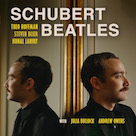

New York Festival of Song: Schubert/Beatles
NYFOS Records
John, Paul, George, Ringo, and … Franz Schubert? Well, why not. He and The Beatles were seminal songwriters of their respective times, and the bodies of work they created continue to resonate with new generations of listeners long after their passing (even if, weirdly, The Beatles received a 2025 Grammy for “Now and Then” mere days ago). Pairing the artists is merely the latest conceptual masterstroke from New York Festival of Song (NYFOS) and its Artistic Director Steven Blier, who've issued a number of distinguished projects on the organization's house label. Piano accompaniment comes from Blier and Kunal Lahiry, with baritone Theo Hoffman the primary vocalist and soprano Julia Bullock and tenor Andrew Owens guests. Adding instrumental colour to selected cuts on the fifty-six-minute release are acoustic guitarists Rupert Boyd and Alex Levine, bassist Sam Weber, and violinist Rubén Rengel.
The album was recorded in April and July 2024, but the Schubert/Beatles program was actually introduced by Hoffman and Blier to NYFOS audiences in NYC eight years ago. The participants' long familiarity with the material is evident in the authority with which it's delivered. Themes overlap from one artist to the other—“Yesterday” and “Im Frühling” both having to do with lost love, for example; an even bolder move would have had The Beatles' material sung in German to draw the two even closer. Blier himself argues that stripped of their “rock music trappings,” “Yesterday,” “If I Fell,” and “Here, There and Everywhere” impress as “pure ballads, a kind of pop bel canto.” Blier's also correct in his assertion that the Fab Four's songs transfer smoothly to the “recital format,” even if not every arrangement is just piano and voice.
In determining the set-list for the recording, songs by the group were picked first, the thinking being that with over 600 Schubert lieder to choose from companionable pairings could be easily devised. By way of illustration, “An schwager Kronos” and “Taxman” make a natural pair, seeing as how the first's emphasis on death aligns it seamlessly to the other's focus on another unavoidable reality. In liner notes, Blier highlights noteworthy parallels between the two: both of their careers were short, Schubert's snuffed out by his early death and The Beatles' formally over after seven revolutionary and exhausting years; and both give voice in their writing to the tumultuous emotional storms of romance, ennui, betrayal, and breakup.
While he's lived with the material for a while, Schubert/Beatles is Hoffman's debut album, and it's one of which he can be justifiably proud. The Juilliard School graduate acquits himself admirably throughout and sings with gusto. Philadelphia-born tenor Andrew Owens excels also, as does American classical singer Julia Bullock, whose profile has risen dramatically during the past few years. Blier is his always enthusiastic self, and the other instrumentalists enliven the songs too.
Hoffman and Owens pair dynamically in “The Word,” with Rengel elevating the spirited rendering with Grappeli-like swing. That rousing intro's followed by a dignified recital treatment of “Here, There and Everywhere” that proves to be a magnificent showcase for both Hoffman and Blier (the same might be said of their wistful take on “Julia”). The baritone's vocal gifts are as well-served by the first of seven Schubert songs, “Die Taubenpost” (“The Pigeon-post”), with Lahiry his partner for the endearing performance. The magic remains firmly in place during the next song, the heartfelt “Alinde” alluring for its longing and desperation; urgent by comparison is “An Schwager Kronos” (“To Kronos, Time's Coachman”), which finds a carriage-bound Hoffman and Lahiry galloping with fervour through rough and rocky terrain. Its diametric opposite is the tender “Licht und Liebe” (“Light and Love”), though Hoffman, Owens, and Blier invest its lyrical expression with no small amount of passion. In a nice changeup, the baritone's accompanied by Boyd for a lovely rendition of “Du bist die Ruh” (“You are repose”).
The rambunctiousness of “The Word” reinstates itself for “Taxman,” with the same personnel returning too. The rhapsodic swoon Hoffman, Owens, and Blier generate makes “If I Fell” an undeniable highlight, and the three to which Bullock contributes are as memorable. One of The Beatles' greatest creations, “She's Leaving Home” weaves Hoffman, Levine, and Bullock's voices into a majestic polyphonic tapestry; abetted by Rengel, the three also distinguish “While My Guitar Gently Weeps" with a deep, sensitive reading that amplifies its sadness and longing. Aside from Blier, she's otherwise alone on “Norwegian Wood” and uses the opportunity to wrest the maximum amount of emotion from the song in her interpretation.
While the album includes many an inspired choice, the world hardly needs another version of “Yesterday”—I'd gladly trade it for Julia Bullock tackling “Dear Prudence.” But even in those cases where the song's overly familiar, the musicians invigorate it with passion and conviction. As the album concludes with the gentle rapture of “Im Frühling” (“In springtime”), chances are you'll agree with Blier's contention that the two “might at first seem like an odd couple—but oh, what a beautiful marriage.” The songwriters do, in fact, find a way to work it out on this fine addition to the NYFOS catalogue.February 2025